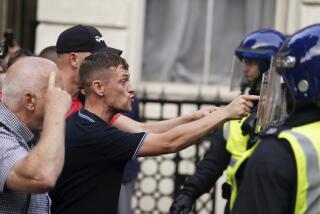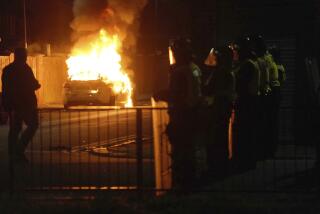After riots, Britain’s Cameron vows to fight ‘moral collapse’
- Share via
Reporting from London —
Britain is in the middle of a “slow-motion moral collapse” that must be reversed if the country is to avoid a repeat of last week’s riots across England, Prime Minister David Cameron said Monday as he promised tough new measures to crack down on lawlessness and promote a responsible society.
But the opposition Labor Party warned against knee-jerk policies incapable of striking at the causes of the looting and violence, in a sign that the political unanimity seen in the riots’ immediate aftermath is fraying as leaders grope for the best way to respond to what happened.
Cameron identified a culture of selfish indifference and greed behind last week’s rampages throughout London and other major cities, which killed five people and caused more than $300 million in damage over four days that rocked the nation. He said he would direct his entire Cabinet to look for ways to combat a “broken society” in which fathers had abdicated responsibility for their children, schools had given up on discipline and crimes had gone unpunished.
“Our security fight-back must be matched by a social fight-back,” Cameron said, pledging to create “stronger families, stronger communities and a stronger society.”
The British leader’s speech at a youth club Monday in his affluent rural parliamentary district was short on specifics. But one Cabinet minister said the Conservative-led government was looking at taking away welfare and other social benefits from anyone convicted in the riots, even if the person is not sent to jail.
The idea is likely to receive a warm reception from the public, whose outrage over last week’s paroxysm of violence would seem to strengthen Cameron’s hand in imposing law and order. But opposition lawmakers and even some belonging to the junior party in Britain’s ruling coalition demur over measures they say could simply aggravate the conditions that helped give rise to the violence.
“Instant and simple judgment in response to these sort of events brings bad solutions,” said Labor leader Ed Miliband. “Knee-jerk gimmicks, not thought through, they won’t solve the problem.”
Just what the problem is, however, has become the subject of increasing dispute.
The motivations and profiles of those who took to the streets have defied easy explanation. Although many critics have branded the theft and destruction of property as wanton criminality by an underclass of “feral” youths, the riots had their roots in a peaceful protest over a fatal police shooting of a man from a London housing estate. Also, the suspected looters hauled into court over the last few days have included residents from middle-class and even affluent backgrounds.
Police have logged more than 2,300 arrests in London, Birmingham and Manchester, the three cities hit hardest by the riots. About 1,600 of those arrests occurred in the capital, with nearly 1,000 people brought up on formal charges already, Scotland Yard said.
Despite the growing division between politicians over how to move forward, both Cameron and Miliband on Monday sounded a theme that has gained currency in the last few days: that selfishness and contempt for the rules are not the province of the rioters alone but are also seen in powerful echelons of British society — the bankers who squandered billions in search of profit, the politicians caught abusing their expense accounts, the journalists who hacked into cellphones.
“We’ve seen some of the worst cases of greed, irresponsibility and entitlement,” Cameron said. “The restoration of responsibility has to cut right across our country.”
More to Read
Sign up for Essential California
The most important California stories and recommendations in your inbox every morning.
You may occasionally receive promotional content from the Los Angeles Times.














